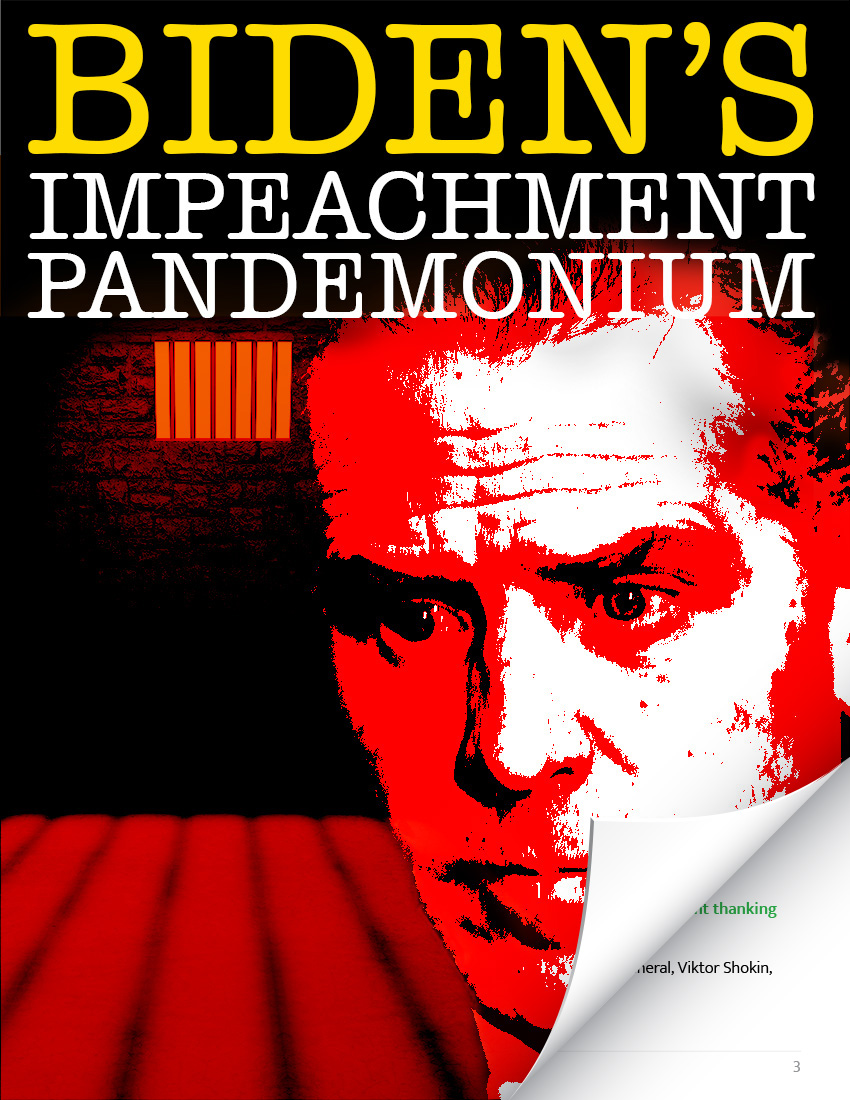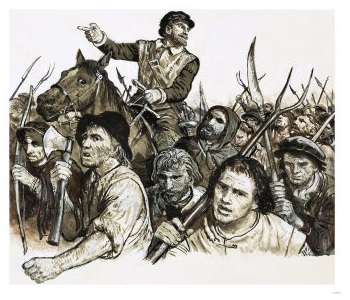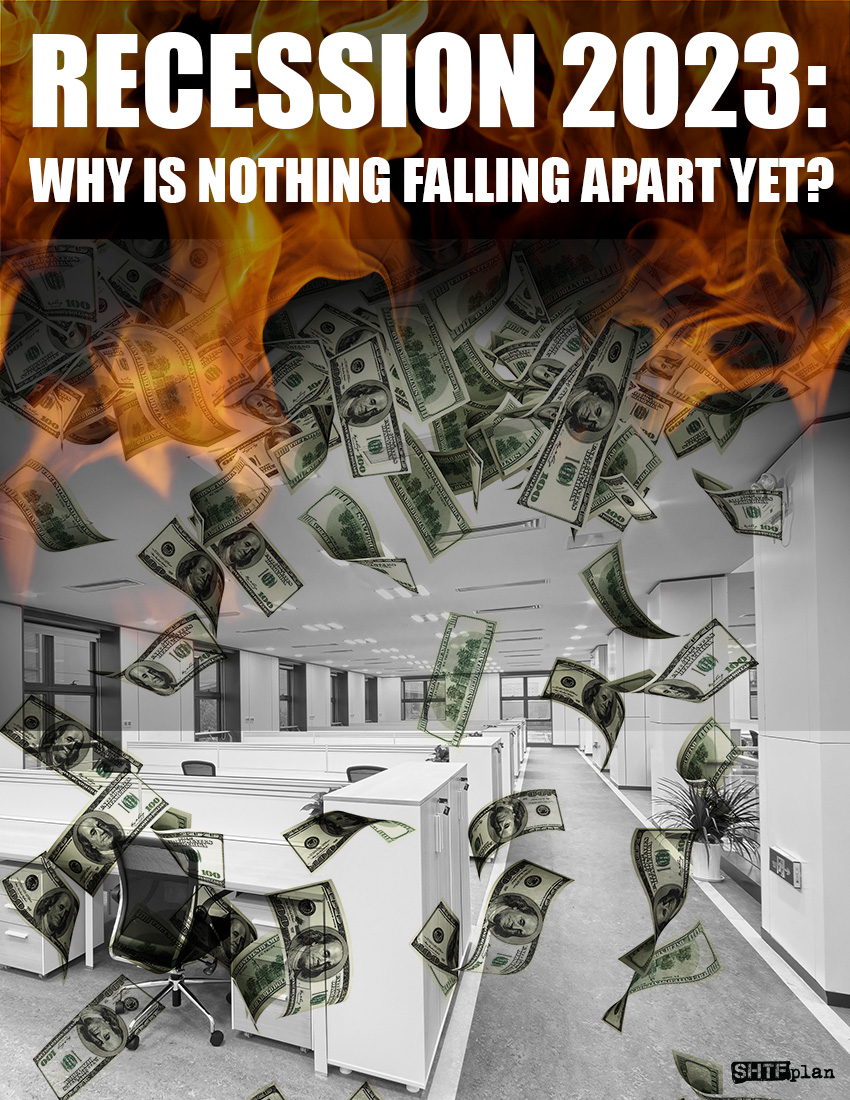
TRUMP SAYS: HUNTER MAKES FORTUNE FROM SHADY DEALS!
BIDEN FAMILY STINKS TO HIGH HEAVENS OF CORRUPTION!
DON'T GET LEFT OUT: HUNTER MUST BE STOPPED!

This article was originally published by Charles Hugh Smith at Of Two Minds Blog.
If you don’t discern any of these dynamics in the present, what are you choosing not to see?

The reason why history rhymes is that humanity is still using Wetware 1.0 and so humans respond to scarcity, abundance, and conflicts over them in the same manner.
I am struck by similarities between the conflict-torn mid-1600s and the present: global climate change (The Little Ice Age in the 1600s), political upheavals, and wars which intertwined civil and imperial conflicts. Global Crisis: War, Climate Change, and Catastrophe in the 17th Century is a fascinating overview of this complex era which disrupted regimes and empires from England to China.
Climate change (The Little Ice Age) generated scarcities of grain in a time of burgeoning human populations. As in the present day, everyone assumed ample harvests would continue forever–expanding abundance is the New Normal. Alas, Nature is not a steady-state system, and cycles are not tamed by our desire for ever-expanding abundance.
Humans respond to scarcity by assessing who’s getting the biggest pieces of the shrinking pie. When hunger begets desperation, various dynamics are set into motion as those without agency and capital, i.e. political and financial power do whatever they can to get enough to survive while those holding the majority of political and financial power, jockey to maintain or expand their power.
These dynamics are fluid and prone to non-linear flows in which relatively small actions unleash enormous consequences that are not predictable. If we squint, however, we can discern some repeating patterns in this chaotic swirl:
1. Private owners of capital (i.e. elites) seek to influence the state to protect/expand their holdings.
2. The dispossessed/disenfranchised masses seek redress/succor from the state.
3. The geopolitical balance of power becomes increasingly precarious as competition for control of resources and political power heats up.
4. The state’s resources are diminished by famine, the decline of trade, etc. as pressures from geopolitical rivals, elites, and the masses are spiking, reducing the state’s ability to respond to the multiple challenges/overlapping crises.
5. The overlapping crises reveal and exploit the weaknesses in the political, social, and economic structures, and in the competing elites.
6. Leaders concentrate on centralized power in the hands of the few as a coping strategy by reducing the influence of broad-based councils, assemblies, etc. This concentration of power at the expense of the many (including lower-level elites who were accustomed to holding some consequential power) increases the resistance of those being cut out of the decision-making and increases the odds of catastrophic errors of judgment in the few at the top.
7. As the state falters or divides into warring factions, the most powerful elites take control of resources and power from the state, both as a defensive measure and as a means of exploiting the crisis to their own advantage.
8. Populist leaders arise demanding a fairer distribution of resources and power. The more repressed the masses, the greater the disorder created by this emergence of long-silenced voices.
9. Each node seeking to defend or expand its share of resources and power projects and amplifies persuasive rhetoric, symbols, and beliefs to unify its supporters around deeply held values and aspirations.
10. With so many loyalties in play–local, regional, linguistic, political, social, religious, and economic–each node/faction seeks to decisively cement loyalties by establishing all-or-nothing hard lines via ideologically “pure” rhetoric that demonizes competing factions, effectively dividing the populace into us-and-them camps that leave little middle ground for compromise or negotiation.
11. In this fevered competition for loyalty and trustworthy followers willing to sacrifice for the faction, leaders view every advance as evidence that compromise is unnecessary as total victory awaits the next “win.”
12. Given the grievous losses and potentially devastating consequences of competing factions gaining ground, the victors of each battle hasten to take revenge on the losing faction, laying waste and inflicting cruelties that harden the hearts of the surviving losers and inciting their own determination to exact a full measure of revenge when fortunes turn their way.
13. Only when the land, people, and treasure are all exhausted does the promise of total victory fade, and the factions seek some negotiated settlement that leaves whatever power they still have intact lest they lose everything.
14. The eventual settlement could have been reached in the initial stages of disorder, but the leaders of the factions were too myopic, too confident in their own judgment and power, too greedy for more, and too hubris-soaked to appreciate their own weaknesses and the immense pitfalls ahead.
If you don’t discern any of these dynamics in the present, what are you choosing not to see?


It Took 22 Years to Get to This Point
This article was originally published by Michael Snyder at The Economic Collapse Blog. When one...
The United States doubled its troop presence in Syria to 2,000 as the ruling class is determined...
This article was originally published by Lance D. Johnson at Natural News under the title:...
Commenting Policy:
Some comments on this web site are automatically moderated through our Spam protection systems. Please be patient if your comment isn’t immediately available. We’re not trying to censor you, the system just wants to make sure you’re not a robot posting random spam.
This website thrives because of its community. While we support lively debates and understand that people get excited, frustrated or angry at times, we ask that the conversation remain civil. Racism, to include any religious affiliation, will not be tolerated on this site, including the disparagement of people in the comments section.


youtube.com/watch?v=cS9wzAjbJ24
Cormorant fishing is analogous to statism, in that the birds would eat, independently, without a minder.
youtube.com/watch?v=ZtzAQHDNBcs
Some time between hunting, gathering, and urbanization, some bureaucrat made it “illegal” (sic) to affix a hide to a basket, for a homemade raft.
Laundry baskets, on poles, and to make sea salt have been called anti-social acts.
“Drain the Swamp” video —
youtube.com/watch?v=gEPdOZbyzbw&feature=emb_imp_woyt
Any independently-productive entrepreneur, of independent loyalties, would arguably fit the definition of a deep state or military-industrial complex.
Fascinating. Thanks Darth.
https://www.youtube.com/watch?v=enMSwz5BWGo
In modern times, the provincial need for such constructs is no longer a constant. The skills are forgotten to the ages, until inevitably, they are once again revitalized through need.
The Roman empire flourished because everyone was encouraged to plant their own olive trees, or to somehow maximize resource harvesting from the land.
My argument today in these modern times, is why don’t people plant more fruit and nut trees on their own lands, as well as within the open spaces and public lands surrounding them?
It may seem odd, but it is tried and true through history. A community with more natural resources anyone can harvest, is a stronger community than it’s counterpart without the resources.
So get out there, and contra plant some fruit or nut tree today. I started with an apple tree right by the front property line, so anyone walking by can have an apple. I have promoted bee and insect health by sprinkling bags and bags of wildflower see bought at big box stores, in open spaces around my area. I hope to get a basement greenhouse together where I can nurture apple and other weather durable trees, so they can be planted in the wild and our local city park.
In the meantime, the cities directives are misguided and we have notice where we are at, how the city will systematically remove all grasses and turn to xeriscape for every park in the future. It’s not a coincidence the city refuses to plant an apple tree on public lands. An apple handed freely is a dime lost in taxation. This is the point, that stronger societies do not need or want everything taxed and controlled in a central complex. To be independent, is to plant your own apple tree.